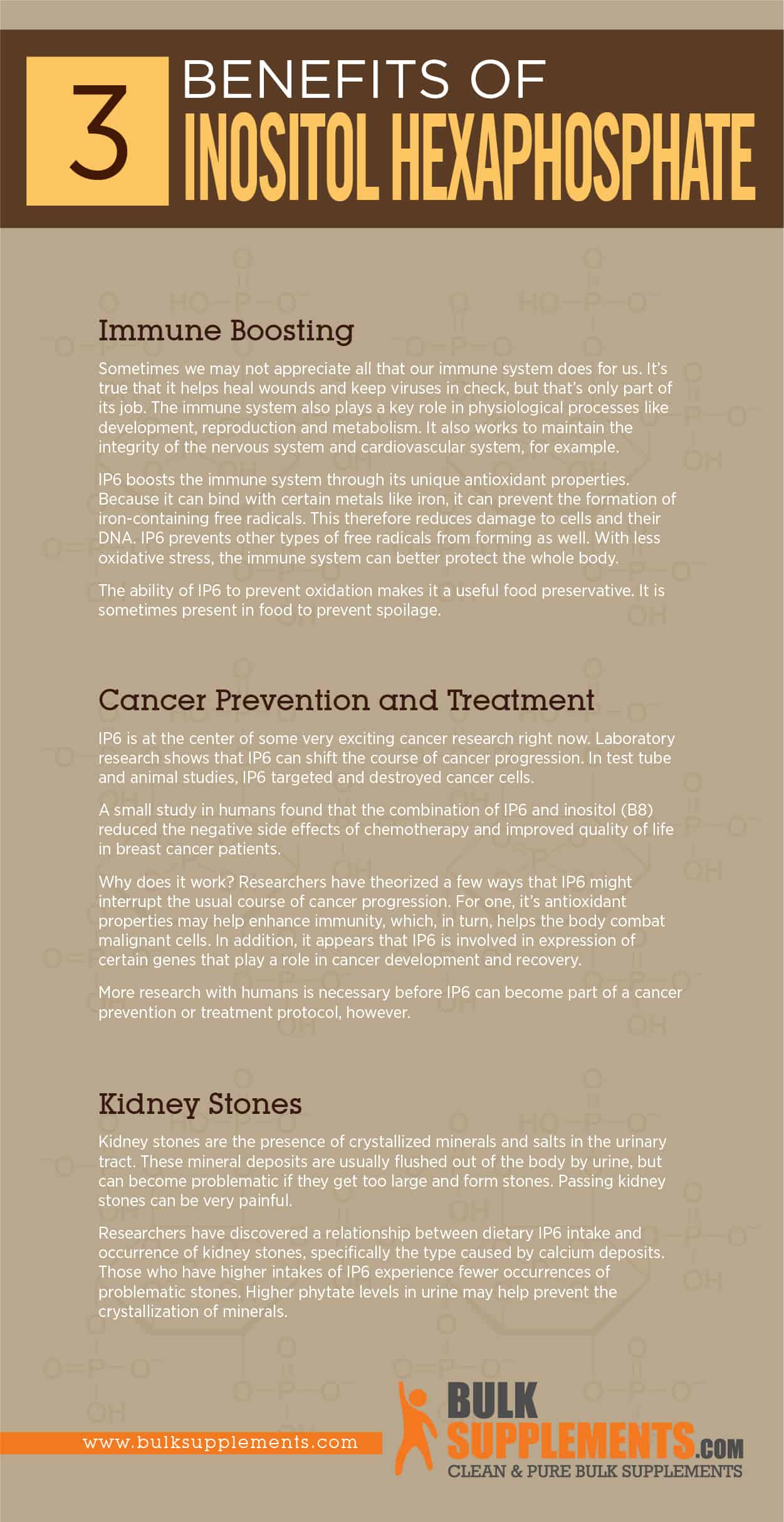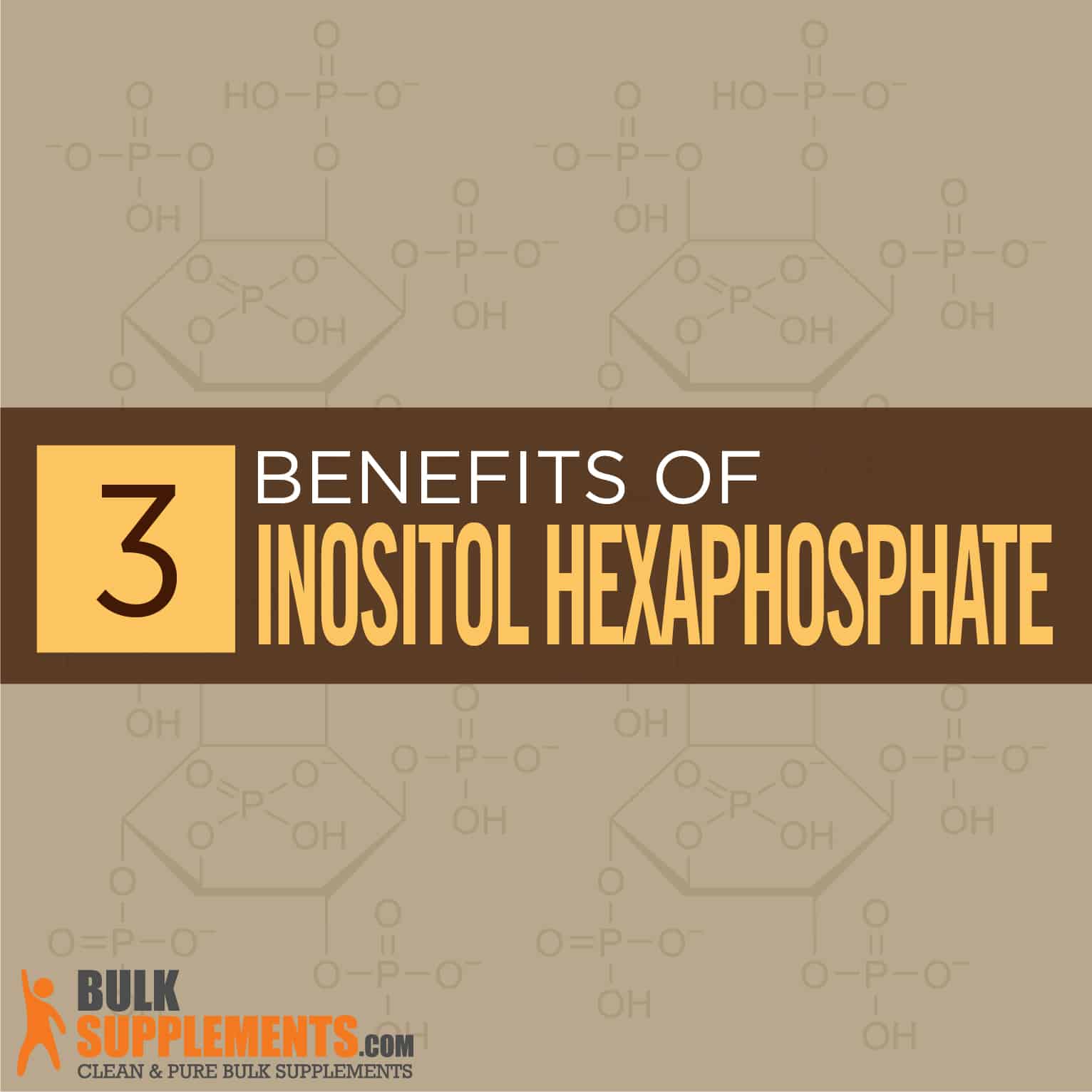What is Inositol Hexaphosphate (IP6)?
Inositol hexaphosphate (also called IP6, myo-inositol hexaphosphate, phytate and phytic acid) is a compound found in nuts, seeds, legumes and grains. Humans make IP6 naturally in their bodies, but aren’t able to digest the IP6 from foods (x).
Before getting into the potential benefits and drawback of IP6, however, it’s important to distinguish it from the compound referred to simply as “inositol”. Inositol (without the hexaphosphate) also goes by the names vitamin B8 and myo-inositol. Understanding the difference is important because IP6 and B8 are both available as dietary supplements but have very different effects on the body.
IP6 has “anti-nutrient” properties because it reduces the absorption of dietary zinc, calcium, iron and magnesium. Sometimes this is a good thing, and sometimes it’s not.
The way IP6 interacts with minerals in the body can be very beneficial for certain people. It acts as an antioxidant, boosts the immune system, and can help reduce the occurrence of kidney stones. On the other hand, too much IP6 in those susceptible to malnutrition or who don’t eat meat can find that it hurts more than it helps.
Inositol Hexaphosphate Benefits
Immune Boosting
Sometimes we may not appreciate all that our immune system does for us. It’s true that it helps heal wounds and keep viruses in check, but that’s only part of its job. The immune system also plays a key role in physiological processes like development, reproduction and metabolism. It also works to maintain the integrity of the nervous system and cardiovascular system, for example (x).
IP6 boosts the immune system through its unique antioxidant properties. Because it can bind with certain metals like iron, it can prevent the formation of iron-containing free radicals. This therefore reduces damage to cells and their DNA. IP6 prevents other types of free radicals from forming as well. With less oxidative stress, the immune system can better protect the whole body (x, x).
The ability of IP6 to prevent oxidation makes it a useful food preservative. It is sometimes present in food to prevent spoilage (x, x).
Cancer Prevention and Treatment
IP6 is at the center of some very exciting cancer research right now. Laboratory research shows that IP6 can shift the course of cancer progression. In test tube and animal studies, IP6 targeted and destroyed cancer cells (x, x, x, x).
A small study in humans found that the combination of IP6 and inositol (B8) reduced the negative side effects of chemotherapy and improved quality of life in breast cancer patients (x).
Why does it work? Researchers have theorized a few ways that IP6 might interrupt the usual course of cancer progression. For one, it’s antioxidant properties may help enhance immunity, which, in turn, helps the body combat malignant cells. In addition, it appears that IP6 is involved in expression of certain genes that play a role in cancer development and recovery (x, x, x).
More research with humans is necessary before IP6 can become part of a cancer prevention or treatment protocol, however.
Kidney Stones
Kidney stones are the presence of crystallized minerals and salts in the urinary tract. These mineral deposits are usually flushed out of the body by urine, but can become problematic if they get too large and form stones. Passing kidney stones can be very painful.
Researchers have discovered a relationship between dietary IP6 intake and occurrence of kidney stones, specifically the type caused by calcium deposits. Those who have higher intakes of IP6 experience fewer occurrences of problematic stones. Higher phytate levels in urine may help prevent the crystallization of minerals (x, x, x).

Inositol Hexaphosphate In Food
When IP6 is discussed in relation to food, it’s usually referred to as “phytates” or “phytic acid.” It’s abundant in nuts, grains, legumes and seeds. Examples include almonds, peanuts, soy, wheat, oats, brown rice, lentils and beans.
The amount of phytate found in food varies greatly, even within the same type of food. Factors including growing conditions, harvesting techniques and the type of fertilizer used can affect the phytate content of a crop. Interestingly, modern high-phosphate fertilizers (like glycophosphate) will produce higher phytate crops than if grown with natural compost (x).
Because of the “anti-nutrient” properties of phytates, some people go out of their way to avoid foods containing them. Soaking, sprouting or fermenting these foods before eating can reduce their phytate content. This may be especially relevant in areas of the world where people’s diets consist mainly of grains, beans and legumes.
Why would anyone try to minimize phytic acid intake when it has so many benefits? The reason is that for some people, especially non-meat eaters, it inhibits some of the absorption of the minerals zinc, iron, magnesium and calcium found in the rest of the plant-based meal. This can put some people at risk for mineral deficiencies and anemia (x, x, x).
A diet that includes even a little bit of meat can help balance the effects of phytic acid. This is because the type of iron found in meat, “heme” iron, can still be absorbed even when eaten with high-phytate foods. Also, even a small amount of animal protein added to an otherwise vegetarian meal increases the overall absorption of zinc (x, x).
Inositol Hexaphosphate Supplement Side Effects & Dosage
There is currently no standard recommend dosage for inositol hexaphosphate in either dietary or supplemental form.
Those with mineral deficiencies or who take mineral supplements may want to consult with a healthcare provider before taking inositol hexaphosphate (x).
People taking anticoagulant or antiplatelet medications should avoid supplemental inositol hexaphosphate because it can increase bleeding (x).
Those who are pregnant or breastfeeding should avoid supplemental inositol hexaphosphate.
The Bottom Line
Unless you follow a strict diet that specifically avoids phytates, you’re likely already consuming inositol hexaphosphate (IP6). Supplementing with additional IP6 may be helpful for certain people, like those prone to kidney stones. And even though the science isn’t quite there to back it up yet, some people are choosing to supplement with IP6 for cancer related issues.


